May 31, 2025 | 13:55 GMT +7
May 31, 2025 | 13:55 GMT +7
Hotline: 0913.378.918
May 31, 2025 | 13:55 GMT +7
Hotline: 0913.378.918

Bac Lieu is famous as one of Vietnam's leading salt producing regions. Photo: Trong Linh.
For many years, the salt business has been an essential component of Bac Lieu residents' livelihoods. Bac Lieu is well-known as one of Vietnam's main salt-producing regions, thanks to its 56-kilometer coastline and ideal climate.
Bac Lieu salt was previously known as Ba Thac salt, a popular folk salt brand connected with the livelihoods of many salt producers that evolved into a traditional coastal craft during the French colonial period.
Salt production in Bac Lieu necessitates a precise balance of expertise and ancient technologies. This method begins with choosing a good place with high salinity and enough of sunlight. Locals use salt fields, where seawater is brought in and evaporated in the sun. The salt crystallizes over time and is then physically harvested.
The salt-making season in Bac Lieu normally begins in November of the previous year and lasts until March of the lunar calendar the following year. Bac Lieu salt continues to build its brand and maintains a place in both domestic and international markets. The salt-making craft requires diligence, hard effort, and understanding, as well as manufacturing experience that is intimately related to nature.
Despite many changes brought about by the use of new scientific technology and mechanization in salt production, the salt villages of Bac Lieu have maintained their pristine beauty and distinctive production methods. Bac Lieu is one of the provinces with the highest salt production areas in the country, with over 1,500 hectares centered mostly in Dong Hai district and a portion of Hoa Binh district, producing more than 15,000 tons per year.
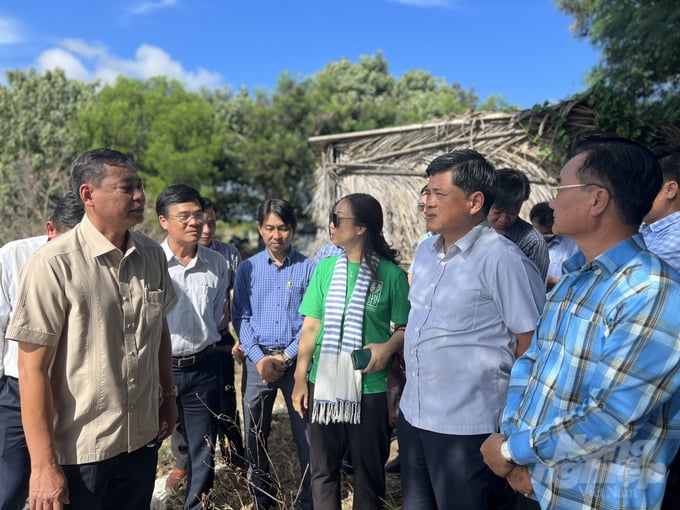
Deputy Minister of Agriculture and Rural Development Tran Thanh Nam (second from right) inspects salt industry infrastructure in Vinh Thinh commune, Hoa Binh district, Bac Lieu province. Photo: Trong Linh.
Mr. Tran Tuan Kiet, Chairman of the Dong Hai District People's Committee, stated that Dong Hai has the largest salt area in Bac Lieu province, measuring 1,280 hectares. In recent years, early-season weather conditions have frequently proved unfavorable for salt production.
Unexpected rainfall in the past two seasons have significantly impacted salt growers.Salt farmers have remained faithful to salt for generations, despite challenges and sometimes losses.
Mr. Tran Tuan Kiet, Chairman of the Dong Hai District People's Committee, stated that salt production in Bac Lieu is still mostly based on sun exposure and is significantly influenced by meteorological conditions, therefore the number of sunny and rainy days each year has a significant impact on salt productivity and quality.
The salt industry not only generates significant cash for salt producers, but it also gives Bac Lieu a distinct cultural identity. Salt festivals, legends, and generational salt-making traditions all reflect the character and identity of this region. Furthermore, Bac Lieu salt is noted for its exceptional quality and has become a valuable export item.
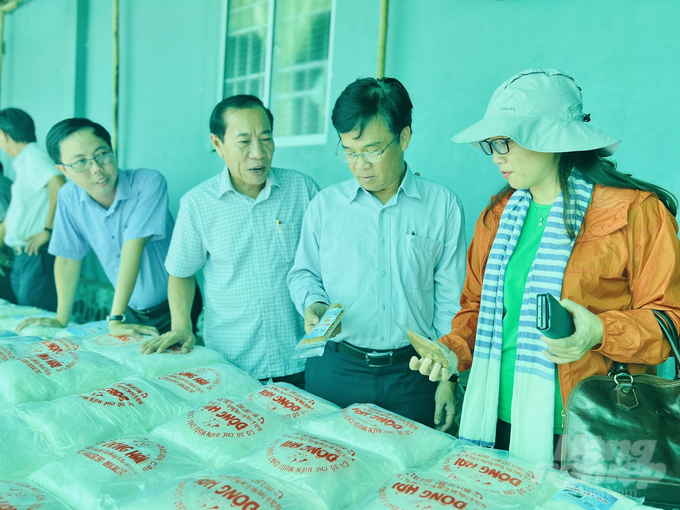
Dong Hai district's salt is recognized as an OCOP product of 3 - 4 stars. Photo: Trong Linh.
In recent years, salt farmers have used a variety of scientific and technological developments to produce high-quality salt on their fields. This technology not only doubles productivity, but also allows the salt to be sold at a greater price due to its superior quality when compared to previous manufacturing methods.
Mrs. Nguyen Thi Thu, a salt farmer from Dien Hai commune (Dong Hai district), expressed her joy: "Traditional salt making has low prices and is inefficient; now, with the plastic sheeting method, the salt crystallizes quickly, the harvest time is shorter, and the prices are higher." I invested over 100 million VND to cover four drying fields, and I anticipate to return my investment in roughly a year."
According to Mr. Nguyen Hong Quoc, Chairman of the Board of Directors of Huy Dien Salt Cooperative (Dien Hai commune), lowering labor necessitates the use of scientific technology and investment in salt manufacturing with plastic sheeting. The cooperative is particularly focused on upgrading salt production technology so that it can manufacture OCOP (One Commune One Product) salt goods.
Mr. Tran Minh Duong, Vice Chairman of the People's Committee of Dien Hai commune, claimed that the Ministry of Agriculture and Rural Development will invest in infrastructure to promote the salt industry in Dong Hai district, including Dien Hai commune. With the funding, the commune will concentrate on building the salt brand to participate in OCOP products, gradually expanding into internal and foreign markets, and even exporting."
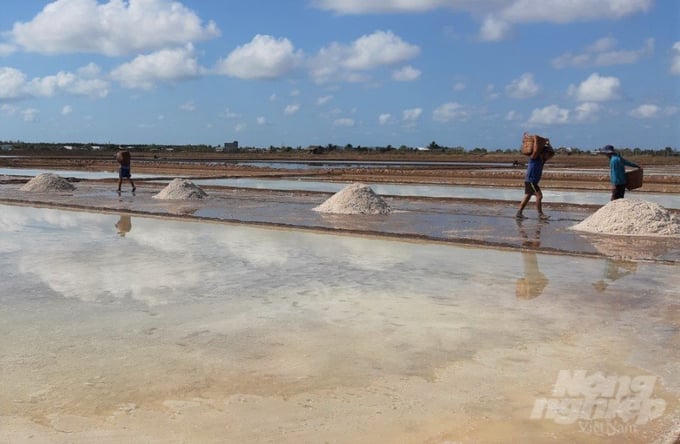
Bac Lieu salt industry has gone through many ups and downs, but salt farmers still retain their traditional features. Photo: NNVN.
Mr. Tran Tuan Kiet, Chairman of the People's Committee of Dong Hai district, stated, "The salt production industry in Dong Hai has existed for over a century, and many households have become well-off or wealthy as a result of this industry." Currently, the district is also assisting those who are passionate about the skill, thereby preserving this historic employment for future generations."
Supportive policies are required to ensure the long-term development of Bac Lieu's salt business. Furthermore, boosting the Bac Lieu salt brand, integrating tourism development, and conserving traditional cultural values are all attractive initiatives.
In recent years, Bac Lieu province has established a number of supportive laws and invested in salt field infrastructure, with the goal of preserving traditional salt production. This dedication is demonstrated by the approval of the Project to Enhance the Value of Salt Production and Processing for the years 2021 to 2030.
In addition to infrastructure investment for salt production, there is a focus on salt processing and exportation, as these steps affect the value of salt grains. Bac Lieu now has two salt processing plants, with a combined designed capacity of around 36,000 tons per year. Some high-quality salt products have been sold to markets including Japan and South Korea.
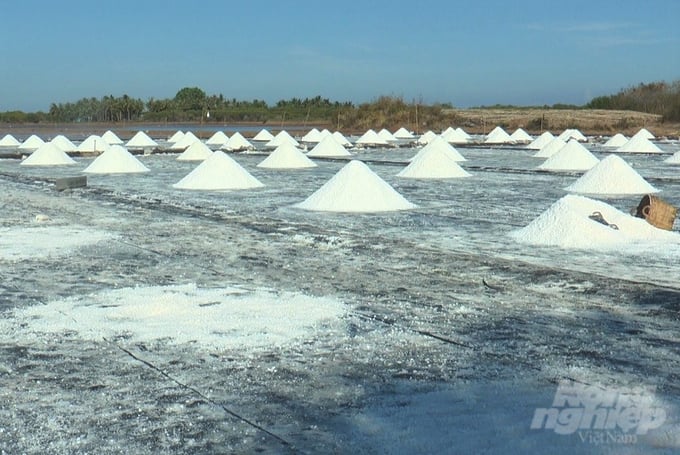
The combination of new technology and traditional techniques will bring Bac Lieu salt farmers better income from the salt industry. Photo: NNVN.
In addition to encouraging local salt farmers to participate and adopting the spread cloth production model, Bac Lieu Salt Company has innovatively constructed a rotating drum dryer during the initial processing stage to reduce salt moisture content from 5% to less than 1%. After drying, the salt grains are consistent in size, dazzling white, and have a distinct salty flavor.
This innovation won first place in the Bac Lieu Province Technical Innovation Contest VI, overcoming the drawbacks of traditional static tray and sieve drying methods, which were labor-intensive, used more fuel, caused equipment damage, and resulted in inconsistent moisture levels in the finished product.
The Ministry of Agriculture and Rural Development has provided funds for the Salt Production Infrastructure Upgrade and Renovation Project in Dong Hai district from 2021 to 2025, totaling more than 130 billion Vietnamese dong. The project entails renovating and building about 15 kilometers of roads and replacing four bridges to service salt manufacturing regions spanning more than 1,300 hectares in Dien Hai and Long Dien Dong communes.
Translated by Linh Linh
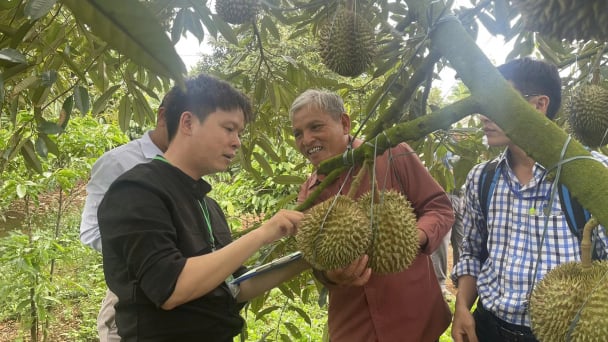
(VAN) For the durian industry to succeed, the value chain must fulfill its commitments to the government, the community, and international partners.

(VAN) Vaccinating juvenile pangasius helps reduce disease, antibiotic use, and farming costs, increasing profits for export-oriented farmers in An Giang.

(VAN) Due to a limited supply of workforce and competitive recruitment requirements, businesses struggle to retain talented veterinary human resources.

(VAN) WOAH’s guidance aims to mitigate disease risks through a One Health approach that balances economic, conservation, and public health interests.

(VAN) Ms. Nguyen Thi Dung, Deputy Director of Ngoc Hoang Cooperative, shared about the journey of bringing dragon fruit to Europe, achieving annual revenues in the billions of VND.

(VAN) Bamboo products from Thang Tho Bamboo Cooperative have reached many countries around the world, while also creating jobs for local workers.

(VAN) The Management Board of Con Dao National Park reported that a green sea turtle, tagged in the Philippines, has traveled thousands of kilometers to lay 84 eggs on Bay Canh Islet.